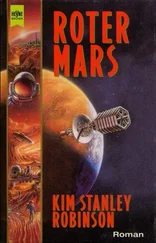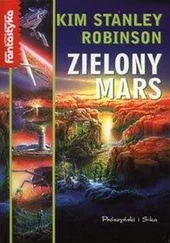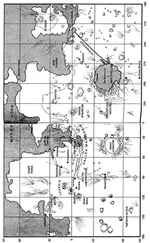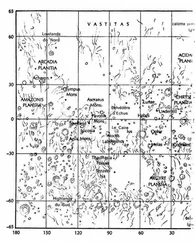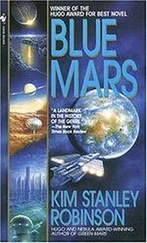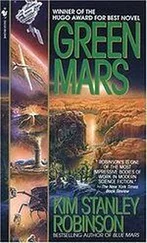And so this slowest of cycles approached its second round. But as the planet was cooling, all of it happened more and more slowly, in a long ritard like a clock winding down. The planet settled into the shape we see. But change never stops: the ceaseless winds carved the land, with dust that grew finer and finer; and the eccentricities of Mars’s orbit meant that the southern and northern hemispheres traded the cold and warm winters in a cycle of 51,000 years, so that the dry ice cap and the water ice cap reversed poles. Each swing of this pendulum laid down a new stratum of sand, and the troughs of new dunes cut through older layers at an angle, until the sand around the poles lay in a stippled cross-hatching, in geometrical patterns like Navajo sand paintings, banding the whole top of the world.
The colored sands in their patterns, the fluted and scalloped canyon walls, the volcanoes rising right through the sky, the rubbled rock of the chaotic terrain, the infinity of craters, ringed emblems of the planet’s beginning. . Beautiful, or harsher than that: spare, austere, stripped down, silent, stoic, rocky, changeless. Sublime. The visible language of nature’s mineral existence.
Mineral; not animal, nor vegetable, nor viral. It could have happened but it didn’t. There was never any spontaneous generation out of the clays or the sulphuric hot springs; no spore falling out of space, no touch of a god; whatever starts life (for we do not know), it did not happen on Mars. Mars rolled, proof of the otherness of the world, of its stony vitality.
And then, one day. .
She hit the ground with both feet solid, nothing tricky about it, the g familiar from nine months in the Ares ; and with the suit’s weight, not that much different from walking on Earth, as far as she could remember. The sky was a pink shaded with sandy tans, a color richer and more subtle than any in the photos. “Look at the sky,” Ann was saying, “look at the sky.” Maya was chattering away, Sax and Vlad spun like rotating statues. Nadezhda Francine Cherneshevsky took a few more steps, felt her boots crunch the surface. It was salt-hardened sand a couple of centimeters thick, which cracked when you walked on it; the geologists called it duricrust or caliche. Her boot tracks were surrounded by small systems of radial fractures.
She was out away from the lander. The ground was a dark rusty orange, covered with an even litter of rocks the same color, although some of the rocks showed tints of red or black or yellow. To the east stood a number of rocket landing vehicles, each one a different shape and size, with the tops of more sticking over the eastern horizon. All of them were crusted the same red-orange as the ground: it was an odd, thrilling sight, as if they had stumbled upon a long-abandoned alien spaceport. Parts of Baikonur would look like this, in a million years.
She walked to one of the nearest landing vehicles, a freight container the size of a small house, set on a skeletal four-legged rocket assembly. It looked like it had been there for decades. The sun was overhead, too bright to look at even through her faceplate. It was hard to judge through the polarization and other filters, but it seemed to her that the daylight was much like that on Earth, as far as she could remember. A bright winter’s day.
She looked around again, trying to take it in. They stood on a gently bumpy plain, covered with small sharp-edged rocks, all half-buried in dust. Back to the west the horizon was marked by a small flat-topped hill. It might be a crater rim, it was hard to say. Ann was already halfway there, still quite a large figure; the horizon was closer than seemed right, and Nadia paused to take note of that, suspecting that she would soon become accustomed to it, and never notice. But it was not Earthlike, that strangely close horizon, she saw that clearly now. They stood on a smaller planet.
She made a concerted effort to recall Earth’s gravity, wondering that it should be so hard. Walking in the woods, over tundra, on the river ice in winter. . and now: step, step. The ground was flat, but one had to thread a course between the ubiquitous rocks; there was no place on Earth that she knew of where they were distributed so copiously and evenly. Take a jump! She did, and laughed; even with her suit on she could tell she was lighter. She was just as strong as ever, but weighed only thirty kilos! And the forty kilos of the suit. . well, it threw her off balance, that was true. It made her feel that she had gone hollow. That was it: her center of gravity was gone, her weight had been shifted out to her skin, to the outside of her muscles rather than the inside. That was the effect of the suit, of course. Inside the habitats it would be as it had been in the Ares . But out here in a suit, she was the hollow woman. With the aid of that image she could suddenly move more easily, hop over a boulder, come down and take a turn, dance! Simply pop in the air, dance, land on top of a flat rock — watch out—
She tumbled, landed on a knee and both hands. Her gloves broke through the duricrust. It felt like a layer of caked sand at the beach, only harder and more brittle. Like hardened mud. And cold! Their gloves weren’t heated the way their boot soles were, and there wasn’t enough insulation when actually touching the ground. It was like touching ice with the bare fingers, wow! Around 215 degrees Kelvin, she recalled, or minus 90 degrees Centigrade; colder than Antarctica, colder than Siberia at its worst. Her fingertips were numb. They would need better gloves to be able to work, gloves fitted with heating elements like their boot soles. That would make the gloves thicker and less flexible. She’d have to get her finger muscles back into shape.
She had been laughing. She stood and walked to another freight drop, humming “Royal Garden Blues.” She climbed the leg of the next drop and rubbed the crust of red dirt off an engraved manifest on the side of the big metal crate. One John Deere/Volvo Martian bulldozer, hydrazine-powered, thermally protected, semiautonomous, fully programmable. Prostheses and spare parts included.
She felt her face stretched in a big grin. Backhoes, front loaders, bulldozers, tractors, graders, dump trucks, construction supplies and materials of every kind; air miners to filter and collect chemicals from the atmosphere; little factories to render these chemicals into other chemicals; other factories to combine those chemicals; a whole commissary, everything they were going to need, all at hand in scores of crates scattered over the plain. She began to hop from one lander to the next, taking stock. Some of them had obviously hit hard, some had their spider legs collapsed, others their bodies cracked, one was even flattened into a pile of smashed boxes, half-buried in dust; but these were just another kind of opportunity, the salvage-and-repair game, one of her favorites! She laughed aloud, she was a bit giddy, she noticed the comm light on her wrist console blinking; she switched to the common band and was startled by Maya and Vlad and Sax all talking at once, “Where’s Ann, you women get back here, hey Nadia, come help us get this damned habitat online, we can’t even get the door open!”
She laughed.
• • •
The habitats were scattered like everything else, but they had landed near one that they knew was functional; it had been turned on from orbit some days before, and run through a complete check. Unfortunately the outer-lock door could not be included in the check, and it was stuck. Nadia went to work on it, grinning; it was odd to see what looked like a derelict trailer home sporting a space-station lock door. It only took a minute for her to get it open, by tapping out the emergency open code while pulling out on the door. Stuck with cold, differential shrinking perhaps. They were going to have a lot of little problems like that.
Читать дальше
Конец ознакомительного отрывка
Купить книгу


